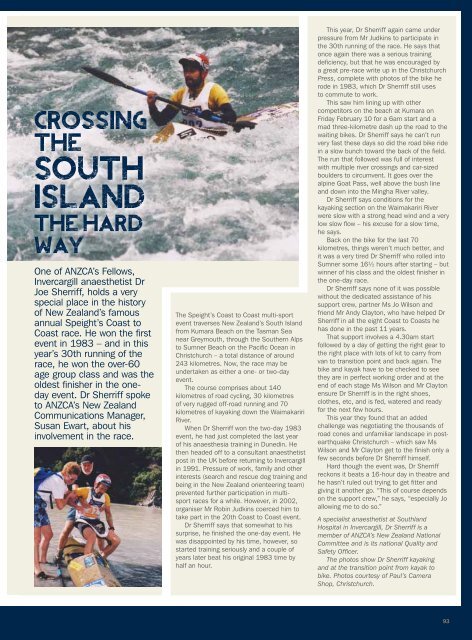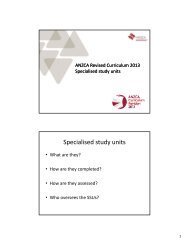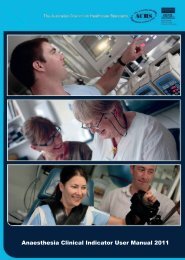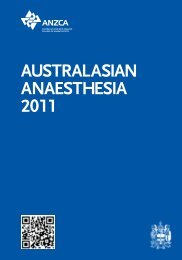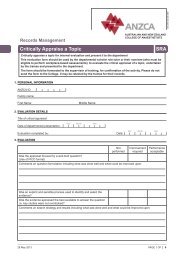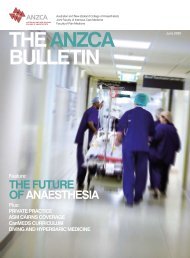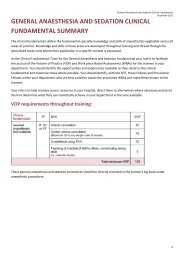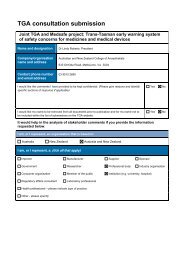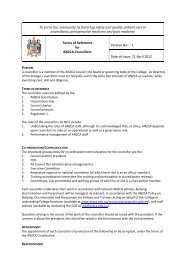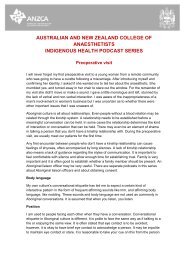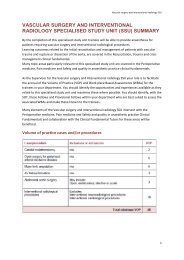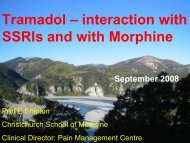ANZCA Bulletin June 2012 - final.pdf - Australian and New Zealand ...
ANZCA Bulletin June 2012 - final.pdf - Australian and New Zealand ...
ANZCA Bulletin June 2012 - final.pdf - Australian and New Zealand ...
- No tags were found...
You also want an ePaper? Increase the reach of your titles
YUMPU automatically turns print PDFs into web optimized ePapers that Google loves.
Crossingthesouthisl<strong>and</strong>the hardwayOne of <strong>ANZCA</strong>’s Fellows,Invercargill anaesthetist DrJoe Sherriff, holds a veryspecial place in the historyof <strong>New</strong> Zeal<strong>and</strong>’s famousannual Speight’s Coast toCoast race. He won the firstevent in 1983 – <strong>and</strong> in thisyear’s 30th running of therace, he won the over-60age group class <strong>and</strong> was theoldest finisher in the onedayevent. Dr Sherriff spoketo <strong>ANZCA</strong>’s <strong>New</strong> Zeal<strong>and</strong>Communications Manager,Susan Ewart, about hisinvolvement in the race.The Speight’s Coast to Coast multi-sportevent traverses <strong>New</strong> Zeal<strong>and</strong>’s South Isl<strong>and</strong>from Kumara Beach on the Tasman Seanear Greymouth, through the Southern Alpsto Sumner Beach on the Pacific Ocean inChristchurch – a total distance of around243 kilometres. Now, the race may beundertaken as either a one- or two-dayevent.The course comprises about 140kilometres of road cycling, 30 kilometresof very rugged off-road running <strong>and</strong> 70kilometres of kayaking down the WaimakaririRiver.When Dr Sherriff won the two-day 1983event, he had just completed the last yearof his anaesthesia training in Dunedin. Hethen headed off to a consultant anaesthetistpost in the UK before returning to Invercargillin 1991. Pressure of work, family <strong>and</strong> otherinterests (search <strong>and</strong> rescue dog training <strong>and</strong>being in the <strong>New</strong> Zeal<strong>and</strong> orienteering team)prevented further participation in multisportraces for a while. However, in 2002,organiser Mr Robin Judkins coerced him totake part in the 20th Coast to Coast event.Dr Sherriff says that somewhat to hissurprise, he finished the one-day event. Hewas disappointed by his time, however, sostarted training seriously <strong>and</strong> a couple ofyears later beat his original 1983 time byhalf an hour.This year, Dr Sherriff again came underpressure from Mr Judkins to participate inthe 30th running of the race. He says thatonce again there was a serious trainingdeficiency, but that he was encouraged bya great pre-race write up in the ChristchurchPress, complete with photos of the bike herode in 1983, which Dr Sherriff still usesto commute to work.This saw him lining up with othercompetitors on the beach at Kumara onFriday February 10 for a 6am start <strong>and</strong> amad three-kilometre dash up the road to thewaiting bikes. Dr Sherriff says he can’t runvery fast these days so did the road bike ridein a slow bunch toward the back of the field.The run that followed was full of interestwith multiple river crossings <strong>and</strong> car-sizedboulders to circumvent. It goes over thealpine Goat Pass, well above the bush line<strong>and</strong> down into the Mingha River valley.Dr Sherriff says conditions for thekayaking section on the Waimakariri Riverwere slow with a strong head wind <strong>and</strong> a verylow slow flow – his excuse for a slow time,he says.Back on the bike for the last 70kilometres, things weren’t much better, <strong>and</strong>it was a very tired Dr Sherriff who rolled intoSumner some 16½ hours after starting – butwinner of his class <strong>and</strong> the oldest finisher inthe one-day race.Dr Sherriff says none of it was possiblewithout the dedicated assistance of hissupport crew, partner Ms Jo Wilson <strong>and</strong>friend Mr Andy Clayton, who have helped DrSherriff in all the eight Coast to Coasts hehas done in the past 11 years.That support involves a 4.30am startfollowed by a day of getting the right gear tothe right place with lots of kit to carry fromvan to transition point <strong>and</strong> back again. Thebike <strong>and</strong> kayak have to be checked to seethey are in perfect working order <strong>and</strong> at theend of each stage Ms Wilson <strong>and</strong> Mr Claytonensure Dr Sherriff is in the right shoes,clothes, etc, <strong>and</strong> is fed, watered <strong>and</strong> readyfor the next few hours.This year they found that an addedchallenge was negotiating the thous<strong>and</strong>s ofroad cones <strong>and</strong> unfamiliar l<strong>and</strong>scape in postearthquakeChristchurch – which saw MsWilson <strong>and</strong> Mr Clayton get to the finish only afew seconds before Dr Sherriff himself.Hard though the event was, Dr Sherriffreckons it beats a 16-hour day in theatre <strong>and</strong>he hasn’t ruled out trying to get fitter <strong>and</strong>giving it another go. “This of course dependson the support crew,” he says, “especially Joallowing me to do so.”A specialist anaesthetist at Southl<strong>and</strong>Hospital in Invercargill, Dr Sherriff is amember of <strong>ANZCA</strong>’s <strong>New</strong> Zeal<strong>and</strong> NationalCommittee <strong>and</strong> is its national Quality <strong>and</strong>Safety Officer.The photos show Dr Sherriff kayaking<strong>and</strong> at the transition point from kayak tobike. Photos courtesy of Paul’s CameraShop, Christchurch.93


